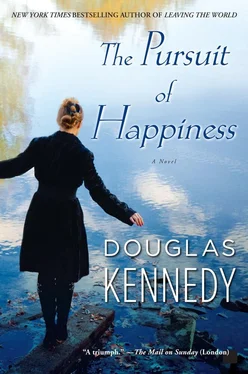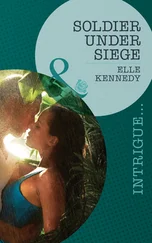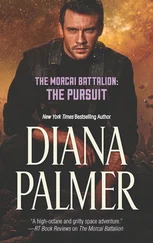'Is something the matter?'
'No. Not at all. I was just wondering...'
'Yes?'
'Well...'
Oh, go on. Spit it out.
'Well', I said. 'I was thinking of taking Ethan to the Children's Zoo on Saturday. You know the Children's Zoo, don't you?'
'Yes. I do'.
'Anyway, we'll be going there around eleven. If you wanted to meet us there... and, maybe, have lunch with us afterwards... ?'
A small pause.
'Yes', she said. 'I would like that very much'.
'Good', I said. 'We'll see you Saturday'.
I put down the phone. I was about to pick it up again to call Meg, but Ethan shouted, 'Mom, you've got to help me'.
I walked into his room. There, scattered across the floor, was a mosaic of useless plastic pieces. Ethan had the assembly instructions in his hand.
'Come on', he said. 'Put it together'.
I groaned and sat down beside him. I groaned again when I glanced at the instructions. They were spread across ten pages and were written in six languages. You needed a degree from MIT to decipher them.
'Ethan, this is really hard'.
'You'll do it', he said.
'Don't be so sure of that'.
'Come on. Try'.
Try. Ha. What do you think I do? All the damn time.
'Mom...' he said, trying to get me to focus on the matter at hand.
I looked up at him - and suddenly saw the resentful, pimply adolescent who would give me the cold shoulder while still desperately needing me. I saw the gangly, awkward college kid, making one mistake after another. I saw the young man, renting his first apartment in New York or Boston or Chicago or wherever - so sure of himself on the surface, yet so riddled with doubt like everyone else. And I wondered: when would it hit him? When would he realize that this is all such a deeply flawed business? That we never get it right? Most of us proceed forward with good intentions. We try our best. Yet so often we fail ourselves and others. What else can we do but try again? It's the only option open to us. Trying is the way we get through the day.
Ethan reached for the biggest piece of plastic on the floor. He held it out to me.
'Please. Make it work'.
'I don't know how to make it work, Ethan. I don't know how to make anything work'.
'You can try'.
I opened my hand. He handed me the lump of plastic. I thought: I don't want to fail you... but I might.
Then I looked up into his expectant eyes.
'Okay', I said. 'I'll try'.
Read on for a preview of Douglas Kennedy's compelling new novel State of the Union...
'State of the Union has the feel of a handgun primed for Russian roulette. The climax, when past and future collide, is explosive'.
The Times
'A mesmerizing page-turner about the breakdown of three generations of an ail-American family'
Sunday Express
'Switching between wry humour and mesmerizing suspense, Douglas Kennedy's novel is perceptive and hugely enjoyable'.
Mail on Sunday
'Kennedy has a thriller writer's ability to keep you turning the pages, while absorbing you in the persuasive detail of one woman's emotional life. Popular fiction at its best'.
Marie Claire
One
After he was arrested, my father became famous.
It was 1966 - and Dad (or John Winthrop Latham, as he was known to everyone except his only child) was the first professor at the University of Vermont to speak out against the war in Vietnam. That spring, he headed a campus-wide protest that resulted in a sit-down demonstration outside the Administration Building. My dad led three hundred students as they peacefully blocked the entrance for thirty-six hours, bringing university executive business to a standstill. The police and National Guard were finally called. The protestors refused to move, and Dad was shown on national television being hauled off to jail.
It was big news at the time. Dad had instigated one of the first major exercises in student civil disobedience against the war and the image of this lone, venerable Yankee in a tweed jacket and a button-down Oxford blue shirt, being lifted off the ground by a couple of Vermont state troopers, made it on to newscasts around the country.
'Your dad's so cool!' everybody told me at high school the morning after his arrest. Two years later, when I started my freshman year at the University of Vermont, even mentioning that I was Professor Latham's daughter provoked the same response.
'Your dad's so cool!' And I'd nod and smile tightly, and say, 'Yeah, he's the best'.
Don't get me wrong, I adore my father. Always have, always will. But when you're eighteen - as I was in '69 - and you're desperately trying to establish just the smallest sort of identity for yourself, and your dad has turned into the Tom Paine of both your home town and your college, you can easily find yourself dwarfed by his lanky, virtuous shadow.
I could have escaped his high moral profile by transferring to another school. Instead, in the middle of my sophomore year, I did the next best thing: I fell in love.
Dan Buchan was nothing like my father. Whereas Dad had the heavy-duty WASP credentials - Choate, Princeton, then Harvard for his doctorate - Dan was from a nowhere town in upstate New York called Glens Falls. His father was a maintenance man in the local school system, his late mother had run a little manicure shop in town and Dan was the first member of his family to go to college at all, let alone medical school.
He was also one shy guy. He never dominated a conversation, never imposed himself on a situation. But he was a great listener - always far more interested in what you had to say. I liked this. And I found his gentle reticence to be curiously attractive. He was serious - and unlike everyone else I met at college back then, he knew exactly where he was going. On our second date he told me over a beer or two that he really didn't want to get into some big ambitious field like neurosurgery. And there was no way that he was going to 'pull a major cop out' and choose a big bucks speciality like dermatology. No, he had his sights set on Family Medicine.
'I want to be a small country doctor, nothing more', he said.
First year med students worked thirteen-hour days, and Dan studied non-stop. The contrast between us couldn't have been more marked. I was an English major, thinking about teaching school when I graduated. But it was the early seventies, and unless you were going through the grind of med or law school, the last thing anyone had on their mind was 'the future'.
Dan was twenty-four when I met him, but the five-year age gap wasn't huge. From the outset, I liked the fact that he seemed far more focused and adult than any of the guys I had been seeing before him.
Not that I knew that much about men. There had been a high-school boyfriend named Jared - who was bookish and kind of arty and totally adored me, until he got into the University of Chicago, and it was clear that neither of us wanted to sustain a long distance thing. Then, during my first semester at college, I had my one short flirtation with freakdom when I started seeing Charlie. Like Jared, he was very sweet, very well read, a good talker, and 'creative' (which, for Charlie, meant writing a lot of what was - even to my impressionable eighteen-year-old eyes - really turgid poetry). He was heavily into dope - one of those guys who was usually smoking a joint with their breakfast coffee. For awhile, this didn't bother me - even though I was never really into his scene. Still, in retrospect, I needed this brief descent into bacchanalia. It was '69 - and bacchanalia was in. But after three weeks of putting up with the mattress on the floor of the crash pad where Charlie lived - and his increasingly obtuse, stoned monologues from deepest Spacey Outer - there was an evening when I came over to find him sitting around with three friends, passing around a humungous joint while blaring The Grateful Dead on the hi-fi.
Читать дальше












